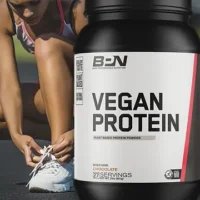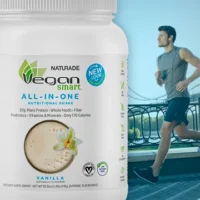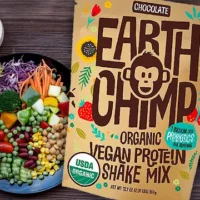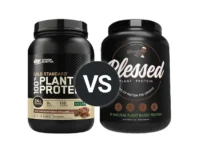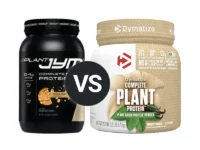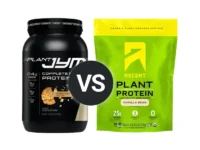Knowledge BaseYou're Questions Answered
How effective is vegan protein powder?
Vegan protein powder is an effective alternative to animal-based proteins, offering unique benefits for muscle growth, recovery, and particularly weight management. Here’s a comprehensive look at its effectiveness and how it compares to animal-based protein sources like whey protein.
Effectiveness of Vegan Protein Powder
- Complete Protein Sources: Many vegan protein powders achieve a complete amino acid profile by blending different plant proteins such as pea, rice, and hemp. This ensures effective muscle repair and growth1.
- Digestibility and Nutrient Density: Advances in processing have improved the digestibility of plant proteins. These powders often contain additional nutrients such as fibers, vitamins, and minerals that contribute to overall health, making them a valuable part of a balanced diet2.
- Weight Management: Plant-based proteins, particularly pea protein, have been noted for their ability to promote feelings of fullness, which can be beneficial for weight loss. Pea protein releases hormones that signal satiety to the brain, helping to curb appetite and potentially reduce overall calorie intake3.
Comparative Advantages of Whey protein
- Quick Absorption: Whey protein is absorbed more rapidly, which can be beneficial immediately post-exercise for muscle recovery and growth4.
- High Leucine Content: Whey protein is particularly high in leucine, an essential amino acid that plays a key role in initiating protein synthesis, making it slightly more effective for building muscle in response to exercise5.
While whey protein offers specific benefits for rapid muscle recovery, vegan protein powders provide a comprehensive array of health benefits that extend beyond muscle building. They are particularly appealing to those with dietary restrictions, such as lactose intolerance or allergies to dairy, and those following a vegan lifestyle.
Choosing between whey and vegan protein powders depends on individual dietary needs, health goals, and personal ethics. Both types of protein can support an active lifestyle effectively when included as part of a balanced diet.
- Gorissen, S. H., & Witard, O. C. (2018). Characterising the muscle anabolic potential of dairy, meat and plant-based protein sources in older adults. Proceedings of the Nutrition Society, 77(1), 20-31.
- Valenzuela, P. L., Morales, J. S., Emanuele, E., Pareja-Galeano, H., & Lucia, A. (2020). Supplements with purported effects on muscle mass and strength. European Journal of Nutrition, 59(8), 3363-3374.
- Diepvens, K., Häberer, D., & Westerterp-Plantenga, M. (2008). Different proteins and biopeptides differently affect satiety and anorexigenic/orexigenic hormones in healthy humans. International Journal of Obesity, 32(3), 510-518.
- Tang, J. E., Moore, D. R., Kujbida, G. W., Tarnopolsky, M. A., & Phillips, S. M. (2009). Ingestion of whey hydrolysate, casein, or soy protein isolate: effects on mixed muscle protein synthesis at rest and following resistance exercise in young men. Journal of Applied Physiology, 107(3), 987-992.
- Phillips, S. M. (2012). Dietary protein requirements and adaptive advantages in athletes. British Journal of Nutrition, 108(S2), S158-S167.
Related Questions
Related Reviews
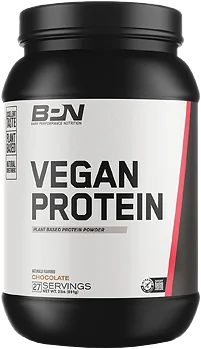
Your Answer
We are a participant in the Amazon Services LLC Associates Program, an affiliate advertising program designed to provide a means for us to earn fees by linking to Amazon.com and affiliated sites.

